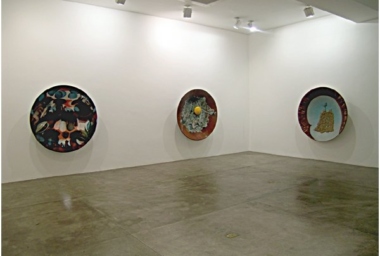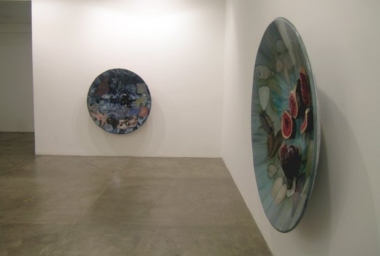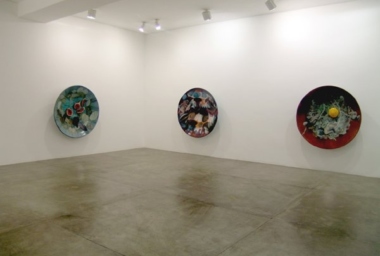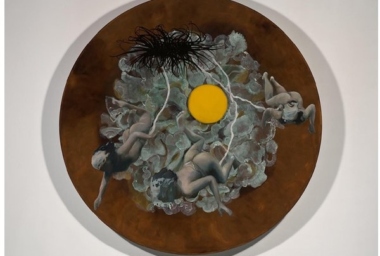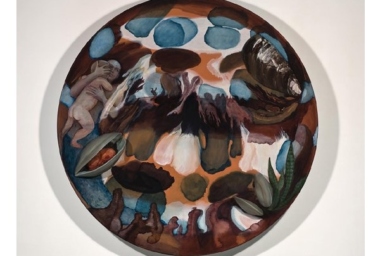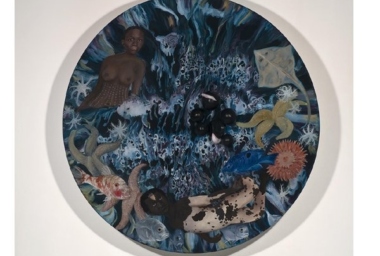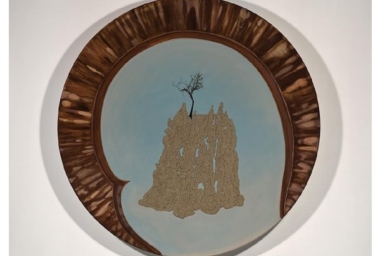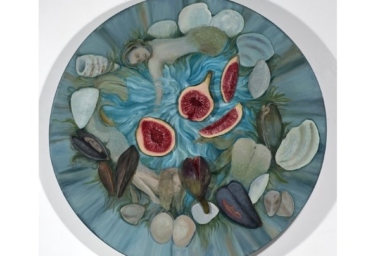Galeria Fortes Vilaça is pleased to present new works by Adriana Varejão. In a significant shift in the course of her production, the artist is showing five three-dimensional paintings whose colors, forms and images are surprising inasmuch as they are unlike anything she has done before, even though they are aligned conceptually with her previous production.
All the paintings are in the form of deep plates measuring one and one-half meters in diameter which present in singular way scenes of mythical characters, fresh fruit, ocean bottoms, shells and sandcastles. If in her well-known series Azulejões the artist enlarged the scale of blue Portuguese wall tiles, this newest set is based on the 19th-century production of Bordalo Pinheiro, in the Portuguese city of Caldas da Rainha. The artist enlarges the scale of the plates and appropriates themes, colors and transparencies, as well as the three-dimensional elements originally used in the ornamentation of these plates.
The raw meat and jerked beef of previous works have given way to fresh fruit, served in small portions, as at a banquet. In Mãe d’água [Water Deity], a Black mermaid nobly reigns over the depths of a stormy deep blue sea, surrounded by sea creatures and a little Black boy whose mottled black-and-white skin blends with the sea’s frothy waves. On the plate’s concave surface there are whole, round, ripe jabuticaba fruits with shiny, dark peels. The entire surface of the plates was first developed, followed by finalization of the sea bottom and the three-dimensional fruits in oil paint.
Another plate, entitled Sereias Bêbadas [Drunken Mermaids], presents apparently inebriated mermaids swimming around succulent figs, their bodies blending with the fruits and seashells in a latently erotic image, “a natural eroticism, with no bad intent or psychoanalysis.” Another undersea scene – this one inhabited by algae and corals – is found in Nascimento de Ondina [Birth of Ondine], the predominant image here being that of a mermaid cradling a baby on her chest. The seashells on this plate include a half-open one with a fetus inside. Pérola Imperfeita [Imperfect Pearl] features another image of fertility, an egg yolk, around which nude female divers connected to an oversized sea urchin swim, contrasted against a bronze background.
The plates are also painted on their backs, with different patterns: Ming, Song, Marajoaran, Catalan. In the fifth painting, Little Castle, a sand castle is seen floating against a misty blue background. The soft and precarious architecture seems to reaffirm a certain oneiric aspect seen in all the other figures. The artist thus signals that among her historic fiction – this huge interconnected tangle of stories from various times – there is also space for private, inner narratives, and for atemporal reflections.
Cobogó Publishers are now finalizing the largest book to date on Varejão’s work. The publication will cover the period spanning from the beginning of her career in the late 1980s up to the artworks in this exhibition. With four texts and 120 images of artworks, the book is slated for release in early 2010.
